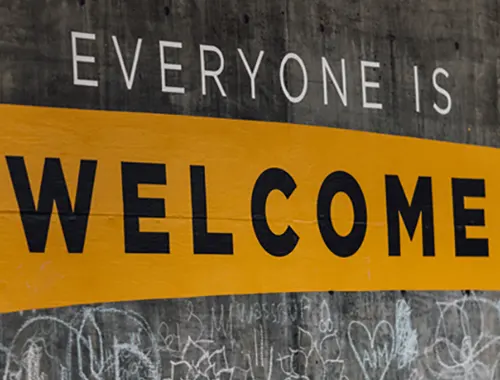Why We Were Formed
The DiversityCanada Foundation was established in 2004 to respond to demographic shifts that were predicted to profoundly impact Canada's economic, social, and cultural life.
Now, nearly two decades later, the DiversityCanada Foundation continues to pay attention to Canada's population changes and the diversity of the experiences of Canadians.
According to Statistics Canada, as of 2019, people born outside of Canada made up over one-fifth of the population. In 2020, the United Nations determined that Canada had the eighth-highest immigrant population globally.
These numbers are set to continue to increase.
Since 2016, immigration has accounted for three-quarters of Canada's total population growth, according to the 2021 Annual Report to Parliament on Immigration. Statistics Canada also predicts that almost one-half of the population could have at least one foreign-born parent by 2031.
What countries are fuelling Canada's population growth?
Just over 30 percent of permanent residents accepted to Canada in 2021 came from India, followed by 7.6 percent from China, 4.4 percent from the Philippines, and 3.8 percent from Nigeria.
Other countries from which large percentages of newcomers originated included France, the United States, Brazil, Iran, Afghanistan, and Pakistan.
The total Indigenous population has also been steadily increasing. In the 2016 census, 4.9 percent of Canada's population was reported as being Indigenous, up from 3.8 percent in 2006 and 2.8 percent in 1996.
According to Abacus Data, Canada also has a long way to go with respect to workplace diversity and inclusion. Their data from a 2021 survey on workplace diversity and inclusion revealed the following statistics:
-
54% of working Canadians say they have witnessed discrimination towards other employees in their workplaces based on factors like age, religion, and race
-
45% of working Canadians say they have experienced workplace discrimination themselves
-
65% of those who say they have experienced workplace discrimination themselves were part of a visible minority
-
60% of those surveyed said that their workplaces ensured equitable treatment for people of colour, women, LGBTQ+ individuals, indigenous peoples, and based on religious beliefs and political opinions.
-
62% also said that they felt their workplaces did a good job ensuring a safe and trusted way to discuss discrimination and bullying and did a good job providing appropriate training and policies to promote diversity and inclusion in the workplace.
Although the statistics show over 60% of people feel comfortable discussing unequal treatment and feel safe in the workplace, almost 40% of Canadians don't.
DiversityCanada is committed to playing a role in promoting diversity and inclusion and creating a fairer society in which Canadian workers of all backgrounds and identities feel valued and can thrive.
Because of Canada's aging population, individuals from the Baby Boomer generation (1946-1964) no longer make up most of Canada's labour force. Instead, millennials, the generation born from 1981-to 1996, is in the majority.
Canada's population is steadily aging. According to the CIA World Factbook, the median age as of 2018 was 42, compared to 40 in 2011. According to Statistics Canada, Canada's biggest age group in 2021 was 55-59 years old, with 2,700,181 people.
DiversityCanada has taken this into account and combatting ageism, within the workforce and in the wider society, is a second priority for the organization. Seniors have a wealth of knowledge and experience to share and we work to provide resources and opportunities to help seniors remain engaged in their communities.
Significant demographic changes bring substantial implications for Canada's social, cultural, and economic life. Among the issues raised due to these changes are inclusion, respect for diversity, and harmony. The DiversityCanada Foundation was formed to play a pivotal role in ensuring such problems are addressed and managed in a way that contributes to Canada's continued development.
The DiversityCanada Foundation wishes to thank its partners whose generous support has made it possible to deliver activities and resources:
 The organization was born in 2004 after Sankar made two cross-Canada tours during which she learned of the dreams and hopes of thousands of Canadians from diverse backgrounds. The challenges they faced spurred her to work towards ensuring that all persons, regardless of background, had a fair and equal opportunity to participate fully in the economic, cultural, and social life of Canada and beyond.
The organization was born in 2004 after Sankar made two cross-Canada tours during which she learned of the dreams and hopes of thousands of Canadians from diverse backgrounds. The challenges they faced spurred her to work towards ensuring that all persons, regardless of background, had a fair and equal opportunity to participate fully in the economic, cultural, and social life of Canada and beyond.











